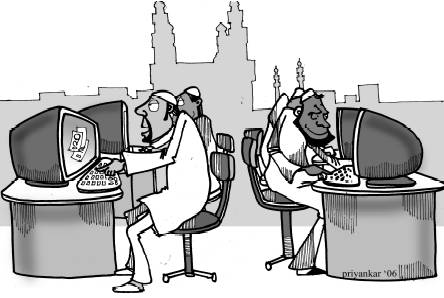Islam-onomics
Skewed perceptions abound by the masses of what would prevail in Egypt if the Muslim Brotherhood took over. Adam Mowafi analyses...

The general assumption was that they were savvy businessmen, capable of bringing a new surge to the Egyptian economy. The problem is, the Muslim Brotherhood have blurred the line between economics and social welfare, confusing what pertains to a healthy economy and what a good distribution of wealth constitutes in regards to social equality.
In all the hoopla of the revolution, people were ignoring the fact that Egypt was going through an economic boom, with huge inflows of foreign direct investment and a surge in tourism, while the rest of the world was going through recession. Were Mubarak era economic policies the best? No, of course not, but factually speaking they were GOOD businessmen. Many argue that all that money was not being fairly spread; my issue with this is that it’s the same in all developed nations – take the US, for example, where the top 20% own 85% of the economy.
Mubarak era policies were not centered around socialism but, frankly, in my opinion, at one stage or another, Egypt would have had to go through some pain to become an economy based on competitive production and services in a capitalist model. Where the revolutionaries went wrong was assuming that the millions of jobs and billions of dollars flowing into Egypt due to Mubarak would continue, and then it would just be a matter of redistributing the wealth. This mentality was disastrous to exactly the type of people this revolution was meant to help the most, the poor. This was mainly due to Ikhwan propaganda – they got Egypt’s most needy focused on the small amounts of cash that were stolen (relative to the total value of monetary inflows in the economy), that they didn’t realize that they would lose their jobs, subsidies and more thank to the Muslim Brotherhood’s economic agenda.
Egyptians were living in an economic bubble created by the Mubarak administration, based on cheap loans and free land. However, the irony is that this bubble, though born of fraud, was turning into a real economy. The businesses created were profitable, the people operating them were capable and this in turn attracted foreign companies to Egypt, happy to exploit what they assumed to be an untapped market of nearly 100 million people.
Even after the revolution, there remained the possibility of keepin Egypt’s economy relatively intact due to the fact that, as far as revolutions go, Egypt’s was fast and relatively clean, not to mention that the Army was ready to play a big role. But the revolutionaries fell for the Ikhwan trap, hook, line and sinker, not knowing who to side with.
As it stands, the Ikhwan are in power and this is the sole reason for Egypt’s crumbling economy. While people spend endless hours stating how similar their policies are to Mubarak’s in regards to economics, it’s the subtle differences which are causing the collapse.
To highlight them here, they are : -
Brain Drain: People ignored the Muslim Brotherhood’s potential to Islamisize the state but, of equal importance, they also ignored the fact that, on a personal level, many of the top businessmen – corrupt or not – will refuse to live and work in a country run by people whose ideologies resemble those of people in the middle ages. The incentive to live and work in Egypt has all but gone.
No experience: The Ikhwan have run supermarkets and were great and providing extra food and oil to the poor when Mubarak was supplying their main requirments but nothing else. People shunned those with experience, labelling them felol but didn’t even think about the consequences of putting people with zero-experience in power
The fact is that out of all political parties, the Ihkwan were more tied in with the NDP than anyone else. They were in parliament and they had several agreements with those in power. For the most part, they never raised any issue about Mubarak’s economic policies and this should have been a massive red flag to anyone assuming they would be different.
One of Egypt’s biggest sources of revenue is tourism, and even if they weren’t banning alcohol (which they are), tourism to Islamic nations (apart from Mecca) is non-existent from western clientele which made up the bulk of Egypt’s industry. Ask yourself when was the last time you heard someone go to Saudi Arabia for its beaches, even though they have some of the world’s best.
There are no sucessesful Islamic economies which are not based on massive oil reserves. Although some site Turkey as an example, it must be noted that Turkey has embraced European culture and will eventually be part of the EU. Frankly it was only because Turkey’s Islamist government was held at bay by their secular army for so long that it prospered. In fact, there are deep concerns in Turkey right now that the religious project might harm the massive developments over the last 20 years.
If Egypt is to progress it will require one of two things:
1. As I am sure the US and Europe had hoped, the MB will need to become more moderate and learn to compromise and share power, as well as give up some of their ideologies when faced with the real world problems of running a country
2. Or, as I suspect they will never compromise, the MB must be removed from power followed by the labeling of the group as a terrorist organization in their current form.
- Previous Article I Got Banged!
- Next Article How (Not) to Get a Haircut
























